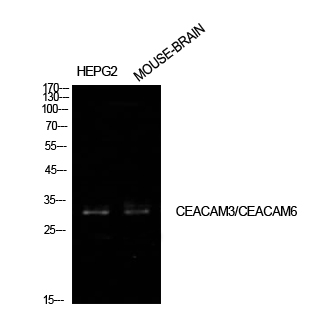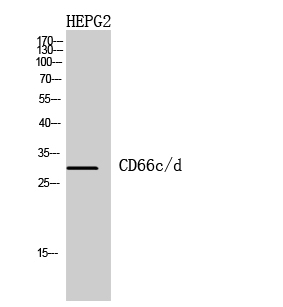

| WB | 咨询技术 | Human,Mouse,Rat |
| IF | 咨询技术 | Human,Mouse,Rat |
| IHC | 咨询技术 | Human,Mouse,Rat |
| ICC | 技术咨询 | Human,Mouse,Rat |
| FCM | 咨询技术 | Human,Mouse,Rat |
| Elisa | 1/10000 | Human,Mouse,Rat |
| Aliases | CEACAM3; CD66D; CGM1; Carcinoembryonic antigen-related cell adhesion molecule 3; Carcinoembryonic antigen CGM1; CD66d; CEACAM6; NCA; Carcinoembryonic antigen-related cell adhesion molecule 6; Non-specific crossreacting antigen; Normal cross-reacting antigen; CD66c |
| Entrez GeneID | 1084/4680 |
| WB Predicted band size | Calculated MW: 27,37 kDa; Observed MW: 30 kDa |
| Host/Isotype | Rabbit IgG |
| Antibody Type | Primary antibody |
| Storage | Store at 4°C short term. Aliquot and store at -20°C long term. Avoid freeze/thaw cycles. |
| Species Reactivity | Human |
| Immunogen | The antiserum was produced against synthesized peptide derived from the Internal region of human CEACAM3/CEACAM6. AA range:31-80 |
| Formulation | Purified antibody in PBS with 0.05% sodium azide,0.5%BSA and 50% glycerol. |
+ +
以下是3篇关于CEACAM6抗体的代表性文献摘要(基于公开信息整理):
1. **文献名称**: *"CEACAM6 as a novel target for antibody-based therapy in pancreatic adenocarcinoma"*
**作者**: Blumenthal RD et al.
**摘要**: 研究开发了靶向CEACAM6的人源化单克隆抗体,体外和体内实验显示其可抑制胰腺癌细胞迁移和侵袭,并通过ADCC效应增强免疫细胞对肿瘤的杀伤作用。
2. **文献名称**: *"Anti-CEACAM6 antibody-drug conjugate induces tumor regression in pre-clinical models of non-small cell lung cancer"*
**作者**: Guo HB et al.
**摘要**: 该文献报道了一种新型CEACAM6抗体-药物偶联物(ADC),在非小细胞肺癌模型中显示出显著抗肿瘤活性,通过靶向递送细胞毒性药物诱导肿瘤细胞凋亡。
3. **文献名称**: *"CEACAM6 promotes colorectal cancer metastasis through triggering macrophage inflammatory response"*
**作者**: Zhang Y et al.
**摘要**: 利用抗CEACAM6抗体阻断实验,揭示了CEACAM6通过激活肿瘤相关巨噬细胞的炎症信号通路促进结直肠癌转移的分子机制,为治疗提供了新靶点。
(注:以上信息为示例性概括,实际文献需通过PubMed或学术数据库检索具体内容。)
CEACAM6 (carcinoembryonic antigen-related cell adhesion molecule 6) is a glycosylphosphatidylinositol (GPI)-anchored glycoprotein belonging to the CEACAM family, which plays roles in cell adhesion, migration, and intracellular signaling. It is overexpressed in various cancers, including pancreatic, colorectal, and breast cancers, where it promotes tumor progression, metastasis, and resistance to therapy by modulating pathways like EGFR and integrin signaling. Its elevated expression is often linked to poor prognosis, making it a potential diagnostic biomarker and therapeutic target.
CEACAM6 antibodies are tools designed to detect or inhibit CEACAM6 activity. In research, they are widely used in diagnostic assays (e.g., immunohistochemistry, flow cytometry) to assess CEACAM6 expression in tissues or cell lines. Therapeutically, monoclonal antibodies targeting CEACAM6 aim to block its oncogenic functions. Preclinical studies show that anti-CEACAM6 antibodies can suppress tumor growth, enhance chemotherapy sensitivity, and reduce metastatic potential. Some antibody-drug conjugates (ADCs) or bispecific antibodies are also under exploration to improve targeting efficiency.
Despite promise, challenges remain, including tumor heterogeneity, potential off-target effects, and limited clinical validation. Ongoing research focuses on optimizing antibody specificity, understanding resistance mechanisms, and exploring combination therapies. CEACAM6 antibodies thus represent a dual-purpose avenue for both cancer diagnostics and targeted treatment strategies.
×